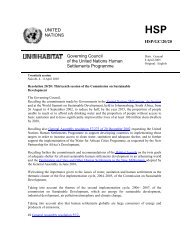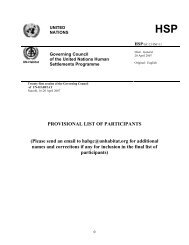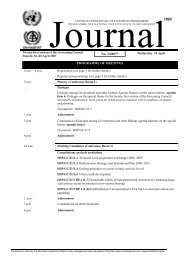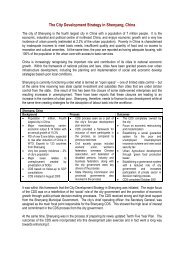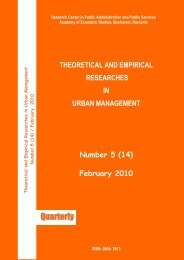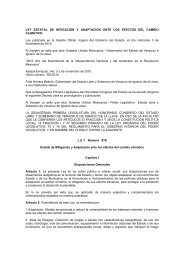Harmonious cities - UN-Habitat
Harmonious cities - UN-Habitat
Harmonious cities - UN-Habitat
You also want an ePaper? Increase the reach of your titles
YUMPU automatically turns print PDFs into web optimized ePapers that Google loves.
OPINION Coping with urbanisation<br />
When a city cannot accommodate everyone, slums like this in Antananarivo, Madagascar are quick to develop Ph o t o © un-hABitAt<br />
Dhaka, Ho Chi Minh City, Lagos, and others<br />
in Africa. Will they cope as well as their predecessors?<br />
Do we need to give them special attention?<br />
Where will the resources come from?<br />
Or will they raise new problems that we have<br />
not yet seen: social, political and economic?<br />
When it comes to <strong>cities</strong> and the poor, most<br />
approaches have concentrated on the issue of<br />
slums and shelter for the poor. I believe that<br />
we need to separate out the issues of income<br />
generation and the provision of living environments.<br />
I do believe that the best strategy for helping<br />
the urban poor is:<br />
• Make the city economy vibrant<br />
• Promote employment growth<br />
• Take care of education<br />
• Take care of health<br />
• Take care of clean water<br />
• Take care of sanitation<br />
• Reduce barriers to entrepreneur al entry<br />
• Promote mobility<br />
• Provide security of tenure<br />
•Equalise public spaces<br />
Our approach to the future of urbanisation<br />
in the next 30 years has to be informed by the<br />
realisation that more urban population will<br />
be added during this period than any com-<br />
6<br />
u r b a n<br />
WORLD<br />
November 2008<br />
parable period in history. This growth will be<br />
concentrated in Asia and Africa, so the best<br />
global thinking on urban management has to<br />
be brought to bear in these regions.<br />
The ongoing process of globalisation and<br />
technical change will bring many new challenges,<br />
including many that cannot be foreseen<br />
today. We will certainly have many more<br />
large concentrations in Asia and Africa and<br />
we will need to learn how to manage their infrastructure<br />
needs, both physical and social.<br />
We will need to focus more than ever before<br />
on the provision of urban amenities. Approaching<br />
public space as the great equaliser<br />
will have to be part of this approach.<br />
The demographic transitions of this century<br />
will be different from those of the last century<br />
with overall rates of population growth falling<br />
everywhere. And with the weight of the urban<br />
population increasing, there will be much<br />
more organic urban population growth than<br />
from rural urban migration. With increasing<br />
longevity everywhere, <strong>cities</strong> will get more<br />
aged everywhere: social security will be problematic,<br />
and providing appropriate facilities<br />
for the aged will be an issue, including special<br />
transport arrangements.<br />
There will also certainly be many poor<br />
people in the growing Asian and African <strong>cities</strong>.<br />
With increasing globalisation and concomitant<br />
growth in income inequality, we<br />
will have to be careful to forestall natural<br />
processes by which the rich try to segregate<br />
themselves in urban enclaves. Encouraging<br />
growth of entrepreneurship and urban employment<br />
opportunities in our <strong>cities</strong> must be<br />
pursued, and not discouraged.<br />
The provision of urban services needs to be<br />
done on a sound financial basis for them to be<br />
sustainable, but the approach has to be inclusive<br />
to engender healthy city growth.<br />
As we cope with the kind of urban growth expected,<br />
it is of the utmost importance that city<br />
governance and management is made much<br />
more innovative, flexible and responsive.<br />
We need intelligent urban governance since<br />
problems keep changing and they require<br />
dynamic responses.<br />
Urban management needs to become much<br />
more professional and attractive so that the<br />
next generation of urban managers are the<br />
best and brightest. We need at least a dozen<br />
international-class schools of urban planning<br />
and management in Asia and Africa over the<br />
next five years. u










